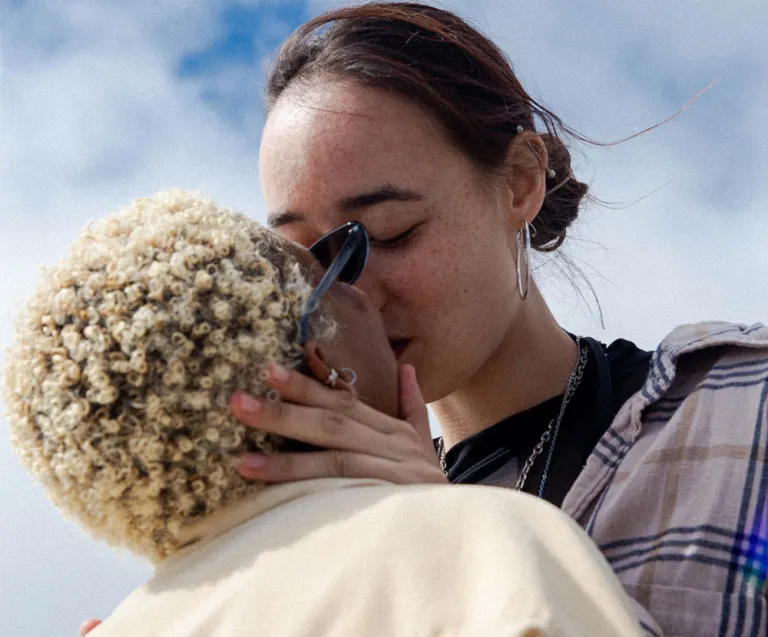
“It’s hard being authentically yourself when the world around you judges you for it.” Educator and author Ruby Rare on bisexuality, non-monogamy, and the urgent need for understanding.
‘Greedy’, ‘slut’, ‘homewrecker’, ‘promiscuous’, ‘going through a phase’, ‘unable to commit’.
As well as being horrible things to say about someone, these negative stereotypes have something in common. They can be used to hurt two different identities: bisexuality, and non-monogamy. Both of these are parts of my identity, as well as topics I speak about through my work as a relationships and sex educator, and I’m fascinated by how they share many of the same prejudices and challenges. It’s something I’m thinking about a lot right now, as I’m currently writing a book about non-monogamy (out 2024!).
Defining bisexuality and non-monogamy
Some quick definitions for you:
- I define bisexuality as being attracted to your own and other genders, which includes non-binary and intersex folks. I tend to use this term to describe myself because it has the most immediate recognition (plus I love the colours of the bi flag), but I also identify with the terms pansexual and queer.
- I define non-monogamy as an umbrella term for conscious relationships styles that sit outside of monogamy. The broadness of this definition allows it to mean different things for different people, but an important aspect of non-monogamy is clear communication, and a shared respect and care for all parties involved.
Dealing with stereotypes about bisexuality and non-monogamy
Now it’s important to state that just because someone is bi, doesn’t automatically mean they’re non-monogamous, and vice-versa. One of my favourite books is Understanding Sex from the 1980s, because the advice it dishes out is so ludicrously bad by today’s standards. In the section ‘Coping with a Bisexual Partner’ (yikes) it’s clear the author genuinely believes that in order for a bi person to be fulfilled they simply must have one partner who’s a man, and one who’s a woman. This assumption links clearly back to the negative stereotypes at the top of this blog post, as well as sticking to a very binaried view of gender and bisexuality. And while I wish this way of thinking was outdated nonsense, sadly it still comes up today.
I run sharing circles for bisexual and non-monogamous folks (two separate events), and I've heard countless stories from participants about how misunderstood they feel in the world, and how easily this sense of misunderstanding can turn into harmful prejudice.
Bisexuality is not dependent on non-monogamy - bisexual people are valid regardless of if we’re single, monogamous, or dating multiple partners. And if you’re monosexual (meaning attracted to just one gender), it’s still valid for you to want to explore relationship styles that sit outside of monogamy. These two identities should be recognised as separate.
How bisexuality and non-monogamy intersect for me
The interesting, and sometimes tricky, thing is, for some people these identities can end up feeling a bit more linked. While it’s true that there are many happy monogamous bisexual people in the world, for me, these two aspects of my identity have become more intertwined. Having more romantic and sexual people in my life allows me to exercise different facets of my sexuality and gender, an aspect of non-monogamy I really value.
And it’s ok for them to be intertwined, I want to celebrate that! What I resent is when this connection creates an opportunity for people to judge or stereotype me. It’s hard being authentically yourself when the world around you judges you for it.
If you relate to my frustrations as a bi and/or non-monogamous person, I hope you find these reminders useful:
- You don’t have to prove anything to anyone! Because we’re raised in a heteronormative and mononormative environment, it can be incredibly easy to disregard these parts of yourself and not feel ‘enough’. Please be extra kind to yourself.
- When you're dating, look out for people who typecast you because of your sexuality or relationship style. You're not there to solely fulfil someone else's fantasies, and anyone who's viewing you like that isn't worth your time!
- Find people to talk to who really get it - whether you have shared experiences or identities, or they’ve educated themselves to understand these issues beyond stereotyping. Think of these people as helping you build a little emotional armour around yourself, and you can help them do the same.
Hope for a better future
Let's end on some hope. Because as frustrating as these assumptions can be, there’s also potential for some really wonderful stuff.
Being queer and/or non-monogamous means having less role models and experiencing traditionally 'normative' relationships from the perspective of an outsider - which brings a whole host of challenges. But along with the adversity comes a cleaner slate, and a chance to rewrite the rules that have been handed down to us. We get to design our own relationships, to build connections with others in ways that truly work for us, which I find incredibly exciting.
Radical thinking is intertwined with queerness and non-monogamy, and I'm continually inspired by the possibilities we get to explore. It's something we should be proud of, and I hope rather than stereotyping, more people can lean in and learn from us in the future.
Ruby Rare (she/they) is an award-winning sex and relationships expert on a mission to get everyone talking more confidently and inclusively about sex.
They're a proud ambassador for Brook, the UK’s leading sexual health charity, and co-founder of the body positive life drawing class, Body Love Sketch Club. Her book Sex Ed: A Guide for Adults is available to buy now, and her TV presenting debut will air this September, as she co-hosts Sex Rated for E4.
Ruby has been listed as one of 24 figures making a positive change to social media in Cosmopolitan’s Positivity Index, and is on The DIVA Power List, which celebrates queer trailblazers changing the game for LGBTQ+ representation.